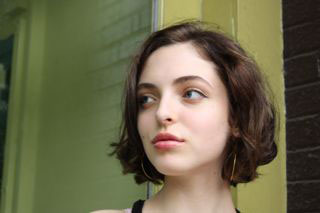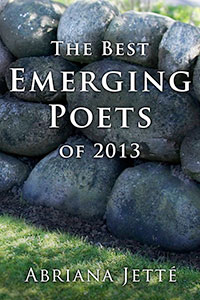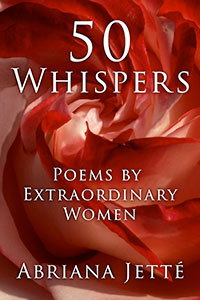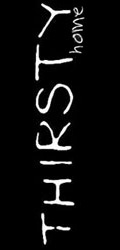

Poets to Soak in this Summer
By Abriana Jetté
Brooklyn, NY, USA

Abriana Jetté
In the summertime, after a baseball game, fireworks brighten the nighttime Coney Island sky. This time of year means street fairs, ice cream trucks, and the scent of charcoal throughout avenues. It means the air is ripe with poetry. In fact, this week couldn't have been more perfect. The rain the weathermen predicted was somehow delayed each day until the storm clouds dissipated. While I walked the dog this evening, I watched the sun paint a kaleidoscope of orange and pink as it set: a canopy of natural wonder.
When I think of summertime in New York City I think of young romance exhaling its first sweet scent of naïve freedom. I think of a deeper connection to water, whether the river, lake, or ocean. Time reinvents itself with each ripple. I think of the might-as-well-be-naked bodies and the chill of the air conditioning from the subway on hot, sweaty skin. When I think of summertime, I think of the forbidden.
We are nothing without that which we cannot have. Consider the myth of Eros and Psyche, the story of Eve and Adam, and the way Pandora's curiosity speaks for the iniquitous behavior of man. To err, as we have been told, is human nature. To want what we can't have, or dream of what we can't have, all of this seems to intensify, for me, when the sun is shining and the people are bronzing and the soft breeze gently cools the back of our necks so that we simultaneously want the heat and the chill, so that, even when we are satisfied, we want it all.
A poem delivers it all. For a brief moment, readers of poetry control the sound, speed, and rhythm of any particular poem even though we have little, if not nothing, to do with its creation. The poets I want you to read this summer deliver morsels of the forbidden in every poem. Their voices capture that intoxicating power of authority as they alter our emotions and tease our imagination.
This summer, when you read Brynne Rebele-Henry, Jenny Sadre-Orafai, and Ani Gjika, I forbid you not to be swept away.

Brynne Rebele-Henry
Spend a few hours sitting on a dark patio in the hot sun and you will quickly realize just how necessary water is to our existence. We are made of it. Some even believe, because of its interdependent relationship to the moon, the presence of water may influence our general health and emotions. That clear liquid literally makes us, and for the most part it is taken for granted: flushed, splattered, spilt, stepped in, and sloshed away. We drink it, freeze it, boil it, pollute it, soak in it, and without it, layer by layer of dry skin would peel off. The ocean is timeless; the perfect symbol for the poet.
Evoking the image of the deepest, most unknown layers of the ocean floor, Brynne Rebele-Henry's "Oceanic Trenches" roots itself in the core of intimate experience. Religious and sexual at once, the poem articulates the emotions of a speaker both sacred and scared, embracing a traditional poetic trope. When one applies the language of religious verse to speak of the everyday the subject matter intensifies – to put anything into the context of the divine is to give it more power. In the poem, secular and religious imagery are so complexly interwoven that each rereading expands on the metaphor behind the title, which seems to refer to the collective unknown, the mystery of being. The poem begins:
"I, an octopus in your hair
My mouth the tectonic drift
A metal sin"
The speaker, like in most of Rebele-Henry's work, is alluringly confident. Controlling a syncopated rhythm that gets right into my mouth – by the time I reach the third syllable of "octopus" the words have already set their net on my lips – the poem continues on intelligently in its juxtaposition of color, "he paints the red of my intestines / powder-laced", and, most of all, in its ability to enter inside the marrow of the reader's bones by describing as much of the inside of the human as possible. First, "the intestines", then the
"bones
My skeleteon says your name twice"
The purposefully lineated breath forces the reader to inhale the image into her very fiber. By the time the reader is told "the devil left early to go golfing", the poem knocks from inside our stomach to let it out. It is twisted in its lineation, in its contrived lack of punctuation, and in its desire to articulate what seems to be an orgasmic, outer-body experience. Even in the poem's most pleasurable moments there is pain. "The bath is a suede bloodletting", the speaker shares, and, soon after, as the poem draws nearer to its close, she describes her legs as "the blue-pink hide of a manatee."
This sort of intentional ambiguity is trademark to Rebele-Henry's poetic voice. "Weird Atlantic", the title poem of her, conjures the rhythmic and aesthetic playfulness of e.e. cummings poem. With deliberately sophisticated vibrations, the poem begins:
"Dark velvet, spacing between
two tongues kinetic radiation (in the)
afterbirth"
The poem controls the reader's breathe through the use of plosives (dark, between) and fricatives (velvet). Similar to "Oceanic Trenches", the poem's rhythms even tremble the reader's teeth. Consider, for instance, the way the line "We are all the wind-torn body in the harbor" lulls and activates the tongue. One thing Rebele-Henry clearly wants is for her poems to enter her readers.
A wild disconnect develops between syntax and logic, which is what makes "Weird Atlantic" so pleasurable. As I've said before, the joy in poetry is hardly derived from understanding the poem, but in feeling somethingfrom the poem. The attempt to discover what lies beneath the complex vocabulary keeps the reader coming back; its enchanting, lucid incantations fulfill the reader's desires. Every line is a new adventure.
Fortunately, the voices of Rebele-Henry's work share a similar desire; only the images are quicksilver. At one point, a mysterious aura embodies "Weird Atlantic." The speaker reflects on a "parasite with her cauldron" and the "Jumble moon, push moon, still-birthed crescent moon." In the next instant, a flurry of sentimentality shivers the reader's skin as the speaker describes how we are all "a landscape of cherry stars." Such inventive verbal rearrangements demonstrate the poet's masterful blend of the outrageous with the natural.
When I read Brynne Rebele-Henry's work I am often left with one question: how does a sixteen-year-old poet occupy such a stunning variety of language? With poets like her, the future of poetry shines bright.
Brynne Rebele-Henry is a visual artist and writer whose work has appeared in The Volta, Souvenir, Alexandria Quarterly, Revolver, and other magazines. She received a Gold Medal for fiction in the 2015 Scholastic Art & Writing Awards and has been nominated for a Pushcart Prize. She was born in 1999.

Jenny Sadre-Orafai
You might say that Jenny Sadre-Orafai is mastering the art of the chapbook. After all, she's published four of them: Avoid Disaster, What Her Hair Says About Her, Dressing the Throat Plate, and Weed over Flower, and each focuses on a particular quality essential to the human experience. Her work rethinks contemporary perceptions of marriage, love, and letting go. And with each new collection (her first full length Paper, Cotton, Leather was recently published for Press 53), the prowess of Sadre-Orafai's voice crystallizes, sufficiently articulating the reality of human ache.
With its monosyllabic, mythic start, "The Burn I Put" begins with the sharp-tongued voice behind much of Sadre-Orafai's work. Whimsical yet dominant, the speaker adopts an omniscient knowledge over the world of the poem. In a way, the speaker of "The Burn I Put" bears responsibility for the world. It begins:
"I was fed the sun
for breakfast every day
for thirty-five years."
On first reading, the poem seems to adopt the voice of our powerful, almighty sun at the moment of its creation. The speaker reveals, "I grew rays for arms", and later how "I became afraid of my self, / my heat", and with this sort of reading the poem stands as an interpretation for the narrative of our brilliant life force. I happen to enjoy the value of reading "The Burn I Put" as a poem that takes on the voice of the sun, for the personification of this hugely awesome power is identifiable and easy to empathize with; however, there is significantly more to this poem.
For the speaker, it has been a lifetime of burning. And for what? Earlier, the reader is told that the speaker's "core glowed / into everyone's sky", and in the last stanza the speaker confides how
"There's nothing more true than:
I burned and burned the past
of everyone's first steps alone"
The first two lines of the final stanza purposefully misguide the reader to feel that the speaker has done no good with her power. Was her heat and glow for nothing? For a moment the reader must wonder, but the very last line of the poem clarifies the speaker's intentions and readjusts the reader's perceptions. In the company of the speaker, no one walks alone. For thirty-five years, this speaker's heat, which seems to me an allegory for love or inspiration, has been properly utilized because it makes those taking the "first steps" less lonely. In this way, the poem can be read as an allegory for creation, not just of the sun, but for art, too.
When we read a poem, we are never alone. We connect to the speaker, to the poet, and more importantly to the voice within our own selves that the poem directly calls to. And when a poet has crafted a voice as witty and familiar as Sadre-Orafai, every reading feels like reconnecting with a dear, long-lost friend.
Because she has often composed poems with a chapbook in mind, Sadre-Orafai's poems are constructed around similar themes. "The Morning of Your 35th Birthday" continues the metaphor of the selfless offering of love found in "The Burn I Put". The first two stanzas of the poem read:
"I was deep in dream.
You were proposing again.
This time in the dark
and I was sitting down."
Straightforward and paratactic, the first stanza offers a concise awareness for what is naturally considered an unconscious state. Adding to the narrative is the mention of the word "again", which insinuates that the speaker has been in this situation before. An instant suspense arises from the description of the dark room. Therefor, even though the reader is kept in a state of unknown, a familiarity develops. The utilization of enjambment in the second stanza, in contrast to the pointed punctuation of the first, offers an aesthetic dissonance to an already strangely intimate scene.
Throughout the poem, the speaker pushes away someone who can be read as a lover, and in true poetic fashion, Sadre-Orafai turns to the majestic power of the ocean as a symbol of her affections.
"I couldn't tell that your face
was the sea or the ocean,
water pushing off from land,
from dark."
The inability to see clearly, that is, the darkness, permeates the poem. It suggests the dawning of another year wearing down the body, and it speaks to the space created by the miscommunication between speaker and (in one reading) lover. Intelligently, Sadre-Orafai's use of couplets parallels the relationship described: together yet apart. A consistently intriguing element within the discourse of the poem is the ability for the poet to refrain from using gender specific pronouns, which expands the possibilities of interpretation.
When the speaker acknowledges, "There couldn't be anything", a quiet heaviness falls upon the reader, and the final image of the "silhouette" of the speaker's other half seems to suggest that the dream, the person, and even the dark, must be left behind.
Jenny Sadre-Orafai is the type of poet who lets you read her heart. She is a fountain of verse; constantly producing elegant, edgy work. She is co-founding editor of Josephine Quarterly and an Associate Professor of English at Kennesaw State University. Her poetry has appeared in Linebreak, Eleven Eleven, Redivider, Thrush Poetry Journal, PANK, Rhino, The Bakery, Sixth Finch, ILK, iO: A Journal of New American Poetry, and Poemeleon. Her prose has appeared in The Rumpus, The Toast, Delirious Hem, The Los Angeles Review, and South Loop Review.

Ani Gjika
In Europe it is not uncommon to hear of someone take off the entire month of August and loosen the muscles and mind in the heat. As a New Yorker, such a luxury is difficult to imagine – I even work most Saturdays –, but as a human being this fact seems incredibly logical. Why not soak in the sun on a scorching afternoon? Why not sit outside and enjoy the breeze while the breeze can be enjoyed? Sooner than later, that soft wisp of wind will transform into a winter chill. One inevitable truth about summer in New York is that it doesn't last.
The end of summer can also mean the end of summer love. As the sun-kissed skin fades, the romance fizzles. Short-lived though it may be, the loss is still real. For many, this sort of heartache results in the birth of poetry. Just think about it. Imagine the cerulean sky wide, the clouds willing to wait, and the pain of letting go beaming on your face.
"Watershed" by Ani Gjika describes a break up in the middle of a beautiful afternoon amongst nature. The first lines read:
"When we were getting closer to the end,
you stood up, took the strawberry
stems we'd discarded
and buried them"
A general ambiguity throbs behind the poem's very first line. The end of what? The path? The road? The day? After reading on, it becomes clear that the voice of the poem intends to speak about the end of a relationship, one that was never meant to be. Throughout the poem, the sun, its heat and its shadow, operates as a direct allegory for their bond. The speaker confesses,
"It was OK
that the sunrise photo I'd framed for you
was slightly out of focus"
The couple leaves Wachusett Rservoir, and readers imagine the "young stalactites / under a bridge like so many exclamation marks / to statements." This sort of melodic assonance best defines the trajectory of Gjika's work; she has a knack for translating the simple image into euphonic soundscape.
"At home / later that evening / rubbing" her "earlobe" the speaker realizes she "no longer had an earring." She soon comes to realize
"I lost an amber earring breaking up with you"
and begins to meditate on what she feels is the serendipitous nature of the physical loss. "Watershed's" intentionally ironic ending --"I'll always know where it is" (the speaker says of her lost earring) is playful and naively heartbreaking at once. Readers know it could be anywhere, just like the ex-lover.
Gjika is also skilled at memorializing the present through the knowledge of the past. A translator and poet, Gjika's work transcends the boundaries of language as she crisscrosses ethnicities and cultures through verse. Born and raised in Albania, Gjika began studying poetry at the age of eighteen when she moved to America with her parents. Because of her ability to think in multiple languages, Gjika's work captures a variety of ideologies, perspectives, and rhythms.
"Names and Nouns" thrusts readers into the narrative of the immigrant experience. As a whole, the poem embraces the chaotic and idiosyncratic traits of a close-knit community, and the prose-like structure enhances the intimacy felt between speaker and characters. Those who live in the same building or floor or home may feel they don't have much space, and the lack of breathing room within the poem offers the reader a similar sense of claustrophobia.
The poem begins with the description of the speaker's grandmother praying each night, "lying on the floor." Listening to her as she sleeps, the speaker lets the reader in on a secret: she wants power, she wants to know it all. Given this knowledge, the reader becomes omniscient. The speaker confides in the reader:
"I accidentally break off
the head of my doll and tell mami that Ergon did
it. Ergon can't speak yet so he can't say he didn't.
Auntie comes to visit."
No one but the reader understands the purposefulness behind the speaker's cruel act. Still, it is natural to question what sort of desires this action reveals. The decapitation of the doll seems commonplace, so we can come to the conclusion that the speaker is no stranger to violence, death, or even manipulation. She is old enough to understand her brother is too young to talk, therefore unable to tell the truth and rat her out. Auntie's visit also conjures up images of death as the smell of mothballs on her coat, "like an old closet", causes the speaker to think about the way the winged creature "eats and eats" and "makes holes." Much of Gjika's work calls to something that is missing.
Throughout the poem, the voice of the poem tries to understand those who live around her. She questions the purpose of the moth as intensely as she questions "where is eno" and "what a gypsy" is. She has soaked up her surroundings, and is trying to place meaning with word. Within the poem, the knowledge of the family is directly related to the ability to understand the word. For Gjika, the genealogy of language coincides with personal history and truth. "Names and Nouns" ends:
"Auntie died. Eno died. The president died. Liza the
whore doesn't come out in the sun anymore…
Old Albanian legends. Mami, read
it again. Mami reads again."
There is a type of delicacy I've come across in poetry that is as honest as it is mystical. It is rare to find a poet who is able to polish and sever language, who handles subject matter and form with immaculate care. Ani Gjika is this type of poet.
Ani Gjika is the author of Bread on Running Waters (Fenway Press, 2013), a finalist for the 2011 Anthony Hecht Poetry Prize and 2011 May Sarton New Hampshire Poetry Prize. She is a poet, translator and English teacher originally born and raised in Albania. A recipient of a Robert Pinsky Global Fellowship and winner of the Robert Fitzgerald Translation Prize, Gjika's poems have appeared in Salamander, Seneca Review, Silk Road Review, Fishousepoems.org and elsewhere. Her translations appear in AGNI Online, Ploughshares, World Literature Review, Two Lines Online and Fishousepoems.org.
Links:
Brynne Rebele-Henry
Jenny Sadre-Orafai
Ani Gjika
Abriana Jetté at Stay Thirsty Publishing
Abriana Jetté







